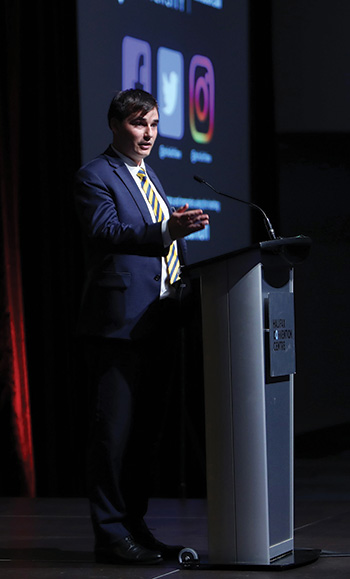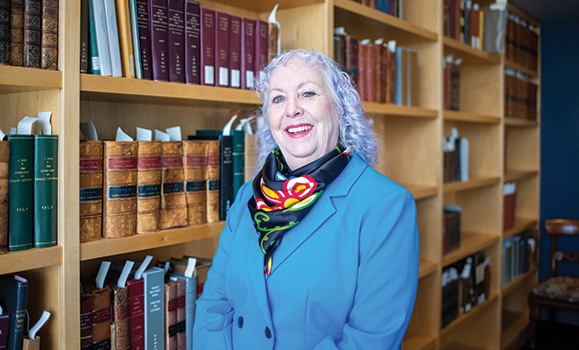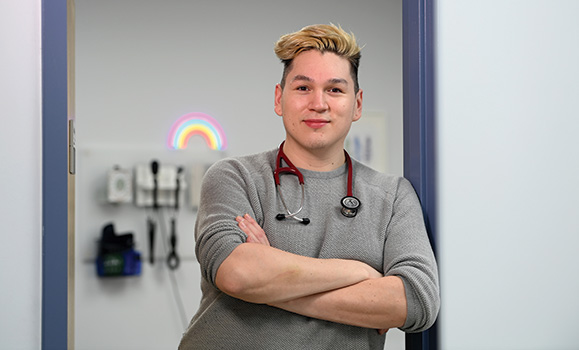Each year, Dalhousie’s Aurum Awards celebrate outstanding alumni who are making contributions to the social, cultural and economic well-being of society. This year’s winners—a dentist, a lawyer, a musician, a judge, and a nurse practitioner—each share a dedication to their communities, a commitment to justice and a passion for change. We are proud to honour them and share their stories with you.
For more, including a , visit .
 Dr. Nada Haidar
Dr. Nada Haidar
Paying it Forward
Halifax-based Dr. Nada Haidar (BSc’93, DDS’97) says dentistry isn’t just her career, it’s her passion—one that stems from the influence of her hardworking, immigrant parents and her own desire to give back. Following some international volunteer work in recent years, Dr. Haidar was inspired after COVID struck to find new ways to help others locally, including her year-round work at the North End Community Health Centre’s dental clinic.
Q. What’s one thing you really enjoy about your work?
A. “I love how artistic dentistry can be. I’m artistic by nature, I think because both of my parents were hairstylists. Art filters into my work every day, whether I’m recreating a tooth, a smile, or just getting to work with my hands.”
Q. What’s the most important lesson you’ve learned?
A. “Over our lives, we accumulate ‘things.’ I’ve learned it’s not about what you have. It’s about what you’ve done, and how you can give back and help others. It’s your legacy. For me, this was quickly realized after I began volunteering.”
Q. What’s the greatest challenge you face, and how do you strive to overcome it?
A. “It’s incredibly challenging for me to see people who need something but can’t afford it. Volunteering is how I overcome that—to help give them what they need. It started a few years ago when my daughter, Mya, and I went on a health mission to Honduras through Global Brigades. We visited different villages where I treated patients. When all travel came to a halt in 2020, I knew I had to focus my efforts more locally, and so began my work with the North End Community Health Centre here in Halifax. My volunteering has since bloomed into a passion. I’ve built trust with these patients, who just needed someone to help them out, to give them their smiles back.”
Q. What motivates you to carry forward?
A. “I’m easily motivated by my time at the North End Community Health Centre, just from the appreciation alone. When I can give someone their teeth back, for free, it’s profound; it’s life changing. I know I was put on this planet to help make that life change.”
(Daniel Abriel, photo)
 Igor Yushchenko
Igor Yushchenko
Bridging Gaps
Halifax-based lawyer and Ukrainian native Igor Yushchenko (LLM’12) understands immigration law and the work required to move people to a new country. But in February of 2022 when Russia invaded his native country, things really hit home. It sparked a personal mission to apply his legal expertise to help fellow Ukrainians—including his own family—seek refuge in Canada. On the one-year anniversary of the start of the war in Ukraine, Yushchenko had personally helped with the immigration applications for over 200 families fleeing war. With the uncertainty of the future, he says his work to help fellow Ukrainians is just getting started and he is ready.
Q. How did your time as a student help shape your career?
A. “When I came from Ukraine to go to Dal, I wasn’t sure what to expect of a new university experience coming into it. But quickly I learned how great Dal would be. The professors are so open, and they really want you to succeed. They care about your opinion, like there is no right or wrong answer. It helped build a confidence for me as I stepped into my career in Canada.”
Q. What aspect of your work do you most enjoy?
A. “I genuinely like to help people. It brings me joy. That’s why I enjoy immigration law, real estate law, and corporate law, because people can gain something from it. I want to see others succeed in life. When a client calls and says, ‘Things are going well now thanks to you,’ I know I’ve done my job.”
Q. What do you want others to learn from your story?
A. “Anything is possible. As an immigrant myself, I didn’t think I would stay once I finished my degree. Then someone told me that I couldn’t practice
law here, and something inside of me said to prove them wrong. That’s a difficult thing—denying that it’s impossible, accepting that it won’t be easy and facing the challenges that may lie ahead. Immigrants need to know that; living your ideal life is not a club for only blessed and chosen people. Everyone has the right to shape their future.”
Q. What’s next for you?
A. “Like so many of us, I hope the war in Ukraine will finish soon. There will be a massive amount of work to do to rebuild Ukraine and to compensate people for their losses. I hope to be part of that team.”
(Cody Turner, photo)

Jeremy Dutcher
Lighting the Way
Jeremy Dutcher (BA’13) is a classically trained composer, performer, musicologist, and activist. As a member of the Tobique First Nation in New Brunswick, he has had a fundamental impact on the way the traditional tribal language of Wolastoqiyik is shared, transforming our understanding of Indigenous cultures and communities. A two-spirit individual, he serves as a role model for Indigenous peoples who identify as LGBTQIA2S+. Dutcher’s 2018 debut album, Wolastoqiyik Lintuwakonawa, was awarded the 2018 Polaris Music Prize and the 2019 Juno Award for Indigenous Music Album of the Year.
Q. What’s the most important lesson you’ve learned?
A. “So often in life, we’re asked to play it small. To dull the flame for the comfort of others. What I’ve witnessed, as a composer and a performer, is that when I truly let it out, it pays off. People receive it. There’s an understanding that each person is unique and brings something new to the family of humanity. It’s our responsibility as people to have it uncovered.”
Q. What do you consider to be your greatest accomplishment?
A. “I don’t pin my personal value to receiving awards. It comes down to the intention of what you do. My culture is in the fight of its life right now, with less than 500 speakers of our language left. My biggest accomplishment has been taking the songs of my ancestors and performing them for my people, in my language, with the orchestra. Lifting our songs up to the highest level and having them received. Having my elders come out, weep, and give thanks. It’s the feeling of connecting people back to what’s been taken and what has been lost. There is urgency in the work, and the moment to do it is now.”
Q. What do you enjoy most about music?
A. “Music cuts right to the heart. It cuts past all the things that are weighing on us—the sonic vibrations bypass all of that. Music comes from understanding. It’s not just entertainment, it’s a means of healing. A concert hall, then, is a healing space. It’s a place where we can see a shared witnessing and through that, find a collective way of thinking and speaking. In concerts, we often see crowds sing together. It’s the feeling of, ‘we are together and music has brought us here.’ As Indigenous people, more broadly, we haven’t had enough of that shared experience. Growing up, it never felt impossible for me. My mom is an Indigenous woman, and my dad is not. But they love each other. If they can, why can’t others? We need to be comfortable asking about things we don’t understand and embracing what makes us different.”
(Cody Turner, photo)

Honourable
Justice Mona Lynch
Pathfinding for Justice
In 2021 when the Taliban returned to power in Afghanistan, the Honourable Justice Mona Lynch (LLB’85) quickly joined forces with other women judges from around the world to help their 250 female colleagues in Afghanistan find a way out. As a regional director of the International Association of Women Judges, Halifax-based Justice Lynch says it’s her mission to ensure they all leave safely and find new homes in free countries.
Q. What’s the most important lesson you’ve learned?
A. “You’re never wrong to do the right thing. By doing your best, staying true to your values, and doing what needs to be done to help others, we can all make the world a kinder, fairer place. It’s always been important for me to make a difference. Part of that work with the women judges in Afghanistan included a 24-hour Zoom call with members of the International Association of Women Judges where we worked around the clock to get the Afghan women judges evacuated. So, I suppose another important lesson I’ve learned is, ‘never underestimate the power of a group of determined, old women in their pajamas.’”
Q. Who has been your greatest role model?
A. “My mother. She was generous, altruistic, and overall, a wonderful person. I learned a great deal from her and try to apply that to my own life every day.”
Q. Why have you focused your efforts in law?
A. “My passion for law started in high school. I took a course in Grade 12 and really enjoyed it. I eventually came to Dal to study commerce and soon after, applied to law school. Once I became a lawyer, I spent a lot of time in courtrooms and always wondered what it would be like to be a judge, to be the one sitting on the other side of the room making the decisions.”
Q. What is your next big goal?
A. “As part of the work we’re doing with the women judges from Afghanistan, we’ve committed to work with them until they’re all out of the country. There are 54 left to go. It’s challenging now because there are not a lot of pathways out of Afghanistan, but we’re working to find the best solutions for each of them. We’ll continue this work until it’s done, until they’re safe.”
(Cody Turner, photo)

Athanasius Sylliboy
Finding Common Ground
Just eight years into their nursing career, Athanasius “Tanas” Sylliboy (MN’20) has become a leader in their community, advocating for improved health outcomes for Mi’kmaq by breaking down barriers and lifting their voices. Particularly during the early days of the pandemic, Sylliboy placed a great focus on finding ways to keep their home community of Eskasoni (Cape Breton) safe. Their determination to bridge gaps between Indigenous peoples and the health-care system has resulted in other recent accolades, including the 2019 Nova Scotia Rising Star Award from the College of Registered Nurses and the 2021 Dr. Robert Strang Community Hero Award.
Q. What impact do you wish to make in your community?
A. “I want to strengthen the relationships between Indigenous communities, health care and society. I want Indigenous peoples to be treated with dignity, love, and respect. I see a lot of Indigenous patients coming into the emergency room who’ve already exhausted all other options before coming in. I want to provide care and build an awareness that helps Indigenous people know that they are worthy and safe. And I want this awareness to not just be felt in today’s generation, but for the next seven generations and beyond.”
Q. What motto do you live by?
A. “In my language there’s an expression that goes ‘mawi–apoqnmatultinej’. It means ‘let us help one another, together.’ Whenever I work with anyone—whether a fellow nurse, a community member or advocate–my grounding principle is that we need to work together. My views and expertise are equally as important as anyone else’s, so let’s use both of our strengths to work together, to benefit others and to find a solution. Whether it’s improving the management of diabetes, improving blood pressure, or anything else, I don’t believe in telling or talking at someone. I want to come together for that solution. I look at my personal relationships the same way—we need to meet in the middle.”
Q. What does this award mean to you?
A. “As a two-spirit person, I feel I have a responsibility to help transform spaces where minorities can be more visible, and to bring opportunities for people to learn and to see themselves in those spaces. I want to share my culture, its language, its beauty, its stories—and to help rebuild trust. I need to be vocal to make change. Receiving this award is an honour and I hope to share my message and inspire others to know that anything is possible if you just stand up for what you believe in. I’m just getting started.”
(Cody Turner, photo)
It is nothing short of inspiring to learn about the incredible work being done by our alumni to strengthen our communities, both here and abroad. Their stories are proof that it only takes one person to make a difference and to create lasting change.
We thank all members of our community who submitted a nomination for this year’s Aurum Awards program, as well as the Dalhousie Alumni Association Awards Committee who were tasked with narrowing down an abundance of incredible submissions.
If you know an alum who deserves to be recognized for their accomplishments, whether in research and innovation, community engagement and leadership, or for their contributions to the social, cultural, and economic well-being of society, stay tuned for , which will open this September.
Learn more at
This story appeared in the DAL Magazine Spring/Summer 2023 issue. Flip through the rest of the issue using the links below.

